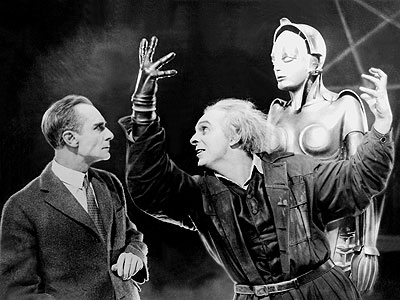"The Mediator between the head and the hands must be the heart! "
A German Expressionist film made in 1927, Metropolis was the most expensive movie of its time, costing around 7 million dollars. While the plot of metropolis is worth noting, it will not be discussed on this page. If you are interested in finding out more about the plot click here.
The image on the right represents the society which the characters live in. The figure on the bottom, sustaining the city on his back, represents the lower class workers who make the hierarchy possible. The city and the tower of Babel itself represent the industrial overtone which pervades the reality of the film, as well as the upper-class citizens.
Dangers of an Overly Urbanized/Machinzed Society
The film somewhat warns the audience against the plights of becoming an overly-mechanized society. The distinct class differences form a society that is completely sustained by the labor of poor working class people, while the upper class must work to sustain their life of luxury.
Biblical Allusions
There are primary biblical allusions present in this movie; each serves as a correlation between specific aspects of capitalist ideology. The first and most obvious is the archetypal saint in Maria: she preaches like a prophet and teaches lessons of peace and forgiveness. The second is to the tower of Babel, which is very prominent and repeated throughout the film. The city of Metropolis itself (yeah!) even features a tower named Babel. The third allusion is to the Hebrew deity Moloch. The name itself means "seed" or "offspring" in Hebrew, while the deity itself is worshipped by means of crematory sacrifice. The significance of this particular allusion is likely due to the theory that sustainable progress by means of hypercapitalist consumerism, for better or worse, is the seed of humanity. In many ways, this could be seen as a response to both capitalism and fascism.
Expressionism
The idea behind film expressionism, in general, is that of the mind being projected into reality. This is exemplified when the machine suddenly transforms into Moloch and demands a sacrifice of humans; although, even in the imaginary reality of the film, it is still just a normal machine.
Also, the projection of the 10 hour clock the workers are maintaining signifies the capitalist ideology behind the citizens' workdays.
Many other prominent examples are rampant throughout the film.
Visual Effects
This film is well known as one of the first cult classic films, and it is argued that this following is based on the remarkable visual effects and overall mise-en-scene presented in the movie. The film’s large budget was primarily spent on building sets. Almost every scene utilizes some sort of man-made background or model as compared to shooting sequences on site. This involved making both many miniature models and full-scale sets.
YES! I agree this page is vague...YES I agree! it needs more....
major edits are ABOUND in this page...
grab em up
We also need some stuff explaining the pictures. Captions anyone?
ps...I hope the image is better this time around I rather like this one I put up.
-William

The images above contain great examples of the visual styling present throughout the film. Notice the ostentatiousness of the characters' gestures as well as the set design. These particular features, as well as the presentational narrative serve to exemplify this film as one of the most influential German Expressionist films in history.
(1)http://en.wikipedia.org/wiki/Metropolis_(film)
(2)http://www.imdb.com/title/tt0017136/
Comments (1)
Sean Desilets said
at 4:04 pm on Oct 16, 2009
* I think the image rocks. In fact, you could probably say something about the interpretation it offers of the film, since it seems be be about the class structure you describe in your account.
* Probably something about interpretive controversies is in order
* Mention of Ufa might be interesting here. In fact, Ufa may need a page
* Something about the way the film addresses the politics of Weimar Germany
* research a bit shallow
You don't have permission to comment on this page.